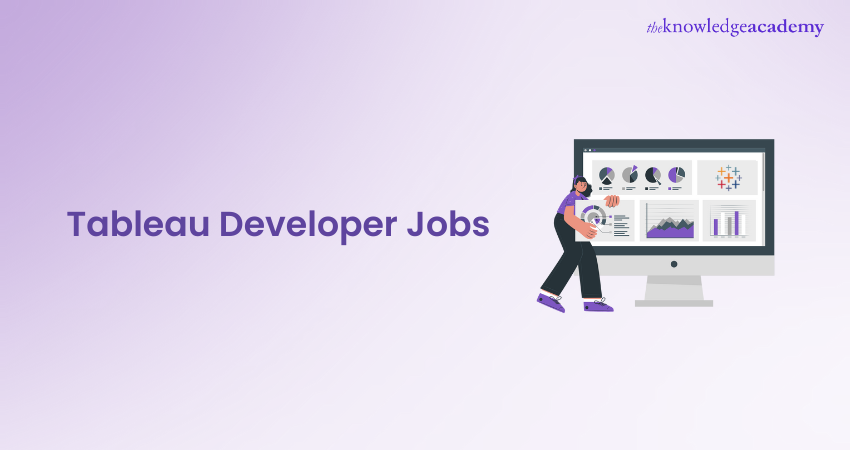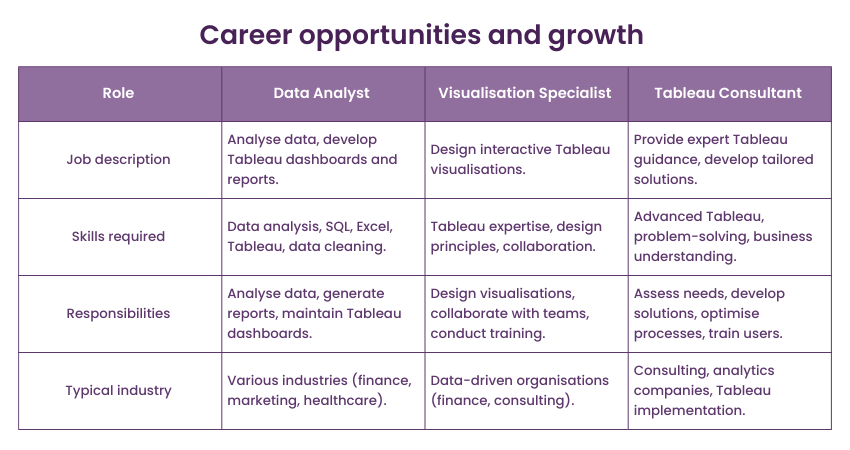We may not have the course you’re looking for. If you enquire or give us a call on +1 7204454674 and speak to our training experts, we may still be able to help with your training requirements.
We ensure quality, budget-alignment, and timely delivery by our expert instructors.

Job opportunities for Tableau Developers have become in demand due to the recent shift in many industry sectors. Organisations gradually discovered the use of Data Visualisation and analysis and understood how these could improve their decisions on important matters of the organisation.
As a Tableau Developer, your primary role will be very important because you will assist the organisation in breaking down its complex data into interactive visualisations and insightful dashboards.
This blog will help you acquire the skills and qualifications to become a successful professional. Read this blog to learn about Tableau Developer Jobs, their roles and responsibilities, expected skill sets, and the necessary qualifications.
Table of Contents
1) Overview of a Tableau Developer
2) Tableau Developer roles and responsibilities
3) Essential skills required for Tableau Developer Jobs
4) Qualifications and educational background
5) Career opportunities and growth
6) Tableau Developer salary
7) Conclusion
Overview of a Tableau Developer
A Tableau Developer has a good grasp of the Tableau software, a versatile Data Visualisation tool. They translate volatile data into understandable information. This position is undoubtedly one of the most important in the current data-oriented world. Tableau Developers fill the space between complicated data and practical ones.
Thanks to the knowledge of a Tableau Developer, organisations may now ground their decision-making on visualised data. Data Scientists' contributions to data-driven decision-making processes are invaluable; stakeholders get to understand trends, patterns, and relationships within the data, which is essential to steering strategic actions and achieving desired outcomes.

Tableau Developer roles and responsibilities
The following enumerates the main tasks and the requirements of a Tableau Developer.
a) Gathering and analysing data requirements from stakeholders: Tableau Developers and stakeholders identify where the data is needed and determine who the users are. The two ensure adequate data is gathered and in the desired format for the analysis and visualisation.
b) Designing and developing interactive dashboards and reports: Tableau Developers embody their expertise and create modern dashboards and reports which manage data attractively and understandably for users.
c) Creating effective data Visualisations for communicating insights: Tableau Developers bring order to messy data and show dashboards with stunning charts and graphs that test users can interpret intuitively and reveal hidden gems in the data.
d) Implementing data quality standards and governance practices: As Developers in Tableau, they maintain data accuracy and integrity by implementing data quality standards and governance practices, validating the data sources used and ensuring data consistency.
e) Collaborating with cross-functional teams to drive data initiatives: Tableau Developer works side by side with the cross-functional teams i.e. Data Analysts, data driven business stakeholders and IT specialists to comprehend business requirements. They then design data initiatives in line with organisational targets.
Unlock deeper insights with LOD in Tableau—Learn how today!"
Essential skills required for Tableau Developer Jobs
A wide range of skills are needed to take the utmost out of Tableau as a visualisation and analytical tool to be an effective Tableau Developer. These are some of the skills that are needed to become a successful Tableau Developer:
a) Proficiency in Tableau Desktop and Tableau Server: For a competent Tableau Developer, a firm grasp of the operations of Tableau Desktop and Tableau Server is crucial, as it refers to its features, capabilities, and functionalities.
b) Strong grasp of Data Visualisation principles and best practices: Tableau Developers should be deeply rooted in the principles of Data Visualisation, including choosing purposeful chart types, colour schemes, and layout designs to develop stunning and easy-to-use graphics.
c) Expertise in data manipulation and blending techniques: Tableau Developers need to be equipped with the skills of working with and combining data from different sources, such as joining tables, aggregating data, and reshaping data structures, to come up with a logical and well-founded visualisation.
d) Ability to write complex calculations and develop custom visualisations: Tableau Developers must be conversant with performing advanced algorithms, formulas, and expressions for Data Analysis and constructing custom graphs and charts for specific business needs.
e) Knowledge of Structured Query Language (SQL) and database concepts: To become a Tableau Developer, one should have a good knowledge of SQL and database concepts since Tableau has a very close interaction with databases to retrieve and analyse the data. This information allows for query optimisation and to unify the data sources.
f) Excellent analytical and problem-solving aptitude: Tableau Developers whose analytical and problem-solving skills are of the highest calibre will be able to analyse a complex data set, visualise patterns and trends, and derive meaningful insights to solve business problems.
Unlock the Power of Tableau's Data Types – Start Learning Today
Qualifications and educational background
To excel as a Tableau Developer, specific qualifications and educational background can significantly enhance Data Visualisation and analysis expertise. Here are the critical qualifications sought for Tableau Developers:
a) Bachelor's or Master's degree in related fields: A formal education in Computer Science, Information Systems, or a related field that provides a solid foundation in Programming, Database Management, and Data Analysis, which are essential for working with Tableau effectively.
b) Relevant certifications in Tableau: Tableau offers certifications that validate an individual's proficiency in specific products and functionalities. Obtaining certifications like Tableau Desktop Qualified Associate or Tableau Server Certified Professional demonstrates expertise in using Tableau for Data Visualisation and analysis.
c) Previous experience in Data Analysis or similar roles: Prior experience in Data Analysis, Business Intelligence, or related fields equips Tableau Developers with practical knowledge and skills in working with data, understanding business requirements, and translating them into actionable visualisations.
Learn how to handle data with our Microsoft BI Training today!
Career opportunities and growth
They have ample professional advancement opportunities, including leadership positions or branching into Data Science or Data Analytics.

Additionally, continuous skill enhancement through learning advanced Tableau techniques and staying updated with market trends is crucial. Due to the increasing reliance on data-driven insights, the market offers competitive salaries for Tableau Developers.
Learn how to make data visually attractive in Tableau with our Tableau Desktop Training – Sign up now!
Tableau Developer salary
Tableau Developers are pivotal in transforming raw data into actionable insights, making them highly sought-after professionals in today's data-driven world. As businesses continue to rely on Data Analytics to drive decision-making processes, the demand for skilled Tableau Developers surges, leading to competitive salaries across industries.
Tableau Developers command lucrative salaries on average, reflecting their specialised skill set and in-demand expertise. According to data from various sources, including Payscale, Glassdoor, and Indeed, the salary range for Tableau Developers varies based on location, experience, industry, and level of expertise.
Learn to build impactful Tableau charts—Turn your data into insights!
In the United States, Tableau Developers typically earn salaries ranging from $70,000 to $130,000 annually. However, salaries can significantly vary depending on geographic location, with metropolitan areas and tech hubs offering higher compensation packages. For instance, Tableau Developers in cities like San Francisco, New York, and Seattle often command higher salaries than those in smaller towns or remote areas.
Moreover, experience plays a crucial role in determining Tableau Developer salaries. Entry-level Tableau Developers with limited experience may start at the lower end of the salary spectrum. At the same time, seasoned professionals with several years of expertise and advanced skills can command higher salaries and earn six-figure incomes.
Industry demand and the organisation's size also influence Tableau Developer salaries. Companies in the technology, finance, healthcare, and consulting sectors often offer competitive compensation packages to attract top talent and remain competitive.
The following table illustrates the average salaries for a Tableau Developer across seven countries:
|
Country |
Average salary per year |
|
USA |
USD 120,000 |
|
UK |
GBP 75,000 |
|
India |
INR 800,000 |
|
Singapore |
SGD 89,236 |
|
UAE |
AED 213,423 |
|
Australia |
AUD 100,000 |
|
Canada |
CAD 90,000 |
Source: Indeed
Conclusion
We hope that you understood this informative blog on Tableau Developer Jobs and learned about the skills and qualifications needed to become one. This job role offers exciting prospects to work with cutting-edge technology and make a substantial impact on data-driven decision-making.
Learn Data Visualisation in Power BI with our Microsoft Power BI Course – Sign up now!
Frequently Asked Questions
Are Tableau Developers in demand?

Yes, Tableau Developers are in demand due to the growing need for Data Visualisation and Business Intelligence solutions across various industries.
Is Tableau easier than Excel?

Tableau is generally considered easier than Excel for data visualization and complex graphical representations, because it provides more dynamic and visually appealing dashboards with less effort.
What is Knowledge Pass, and how does it work?

The Knowledge Academy’s Knowledge Pass, a prepaid voucher, adds another layer of flexibility, allowing course bookings over a 12-month period. Join us on a journey where education knows no bounds.
What are the other resources and offers provided by The Knowledge Academy?

The Knowledge Academy takes global learning to new heights, offering over 3,000 online courses across 490+ locations in 190+ countries. This expansive reach ensures accessibility and convenience for learners worldwide.
Alongside our diverse Online Course Catalogue, encompassing 19 major categories, we go the extra mile by providing a plethora of free educational Online Resources like News updates, Blogs, videos, webinars, and interview questions. Tailoring learning experiences further, professionals can maximise value with customisable Course Bundles of TKA.
What are related courses and blogs provided by The Knowledge Academy?

The Knowledge Academy offers various Business Intelligence Reporting Courses, including Microsoft Power BI Course, Business Objects Reporting course and Minitab Training. These courses cater to different skill levels, providing comprehensive insights into Data Visualisation with Tableau.
Our Office Application Blogs cover a range of topics related to Tableau, offering valuable resources, best practices, and industry insights. Whether you are a beginner or looking to advance your Business Intelligence Reporting skills, The Knowledge Academy's diverse courses and informative blogs have you covered.
Upcoming Office Applications Resources Batches & Dates
Date
 Tableau Desktop Training
Tableau Desktop Training
Fri 11th Apr 2025
Fri 13th Jun 2025
Fri 8th Aug 2025
Fri 26th Sep 2025
Fri 21st Nov 2025






 Top Rated Course
Top Rated Course


 If you wish to make any changes to your course, please
If you wish to make any changes to your course, please


